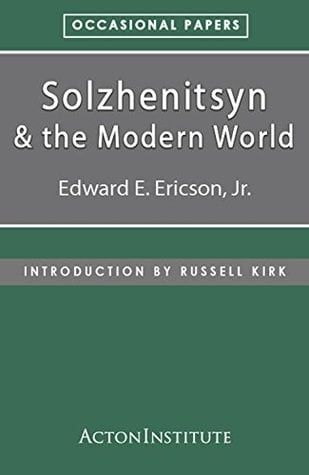Years after his arrest by the Soviet authorities, Aleksandr Solzhenitsyn, while recuperating in a prison hospital after a cancerous tumor had been cut from his body, cast out the last remnant of a spiritual tumor from his soul. A prison doctor, soon to die by the hand of another zek, “fervently” recounted to Solzhenitsyn his conversion to Christianity. “I am convinced,” he told the feverish cancer patient, “that there is no punishment that comes to us in this life on earth which is undeserved.” “I shudder,” wrote Solzhenitsyn in The Gulag Archipelago. “Formerly you never forgave anyone. You judged people without mercy. . . . You have come to realize your own weakness—and you can therefore understand the weakness of others. And be astonished at another’s strength. And wish to possess it yourself. . . . We are ascending.”
“Solzhenitsyn is a Christian writer,” wrote theologian Alexander Schmemann in 1970, before the great artist had publicly proclaimed his faith. The Christian theme of creation, fall, and redemption is indeed at the core of Solzhenitsyn’s art and is invisible only to those who suffer from spiritual myopia, a condition as prevalent in the liberal democracies of the West as it was in the Soviet Union and which distorts all that is seen through the secular lense of politics. Edward Ericson, in Solzhenitsyn and the Modern World identifies the “motive force” behind Solzhenitsyn’s act as Christianity; it is the writer’s religion, not his politics, that Ericson calls the “bedrock” of his “moral universe.” In Solzhenitsyn’s world—the world of homo religiosus—the central conflict of modernity is not between communism and capitalism, nor between Stalinism and socialism or welfare-statism, but “between rejection of God and acceptance of Cod.” “This concept is more difficult for the secular modern West to comprehend than is the atheism of the Bolsheviks,” writes Ericson, which explains the strange parallel dualism of reactions to Solzhenitsyn’s art in the Soviet Union and in the West in the early 1960’s. When Solzhenitsyn’s work was viewed as anti-Stalinist or anti-totalitarian, rather than as anti-communist, antisocialist or—worst of all—anti-modern, he was praised by the Khrushchev regime and by Western critics. But the Soviet machine turned against him as his world view became clearer. He was denounced as an anti-Soviet traitor, a Jew (the KGB would spread the rumor that his real name was Solzhenitzer), a tool of the West; ironically, after a period in which Western writers and critics defended him as anti-totalitarian, he was denounced by his former defenders as “anti-Western,” “authoritarian,” and even “anti-Semitic.” The arrogant having cleared the way for the ignorant, such charges are still commonplace, and so it is largely to the ignorant of the West— meaning the West as a political, economic, and geographic, but not a spiritual or cultural, entity—that Dr. Ericson addresses his much-needed exposition.
Ericson masterfully counters the preposterous charges leveled at Solzhenitsyn by carefully and gently explaining to his semi-educated audience that the biblical and classical sources that help to shape the writer’s “moral universe” are apparent in his work. Solzhenitsyn is a patriotic Russian writer who works in the tradition of Dostoevsky and Tolstoy (which is to say the “broad Western literary tradition”) and an admirer of Switzerland’s decentralized political system, of the New England town meetings, and of the American Founders who hopes for the development in Russia of an organic civil society. Like Edmund Burke, he has no faith in the ability of social engineers to build society from above, and he sees such efforts as attempts to replace Cod as the architect of the universe, as manifestations of Adam’s sin. For Solzhenitsyn Russia is attached to the West by Christianity, and his admiration for the Christian West, as well as his criticism of post-Christian liberal democracy, makes him the most pro-Western of Russophiles.
Ericson’s apologia is a scholar’s extension of Solzhenitsyn’s artistic message, a reflection of the artist’s hope that the West can learn from Russia’s suffering by recognizing the source of its own moral decay and seeking redemption. Solzhenitsyn’s honest criticism of the contemporary West is at a people who should know better, at countries who suffer from cultural amnesia and spiritual emptiness, a condition that manifests itself in the flabby tyranny of the consumerist welfare state. Ericson’s gentle prodding is a hopeful counterattack aimed at enlightening those to whom Solzhenitsyn is a mystery, a literary sphinx who speaks riddles in a now-forgotten language. The message is that the West is not synonymous with liberal mass democracy, that freedom is a condition (a condition, Solzhenitsyn would say, whose prerequisite is personal conversion), not a process. For the arrogant, of course, the most savage opponents of all that Solzhenitsyn believes, Ericson’s book will not be news. They know very well that when Solzhenitsyn speaks of admiring the West he means Christendom. When they say that Solzhenitsyn is the enemy of the West, they understand perfectly which “West” they mean. They will have none of his glorifying Dead White Males, none of his archaic religious moralizing. It is the defenders of the contemporary West who are themselves anti-Western.
[Solzhenitsyn and the Modern World, by Edward E. Ericson, Jr. (Washington, D.C.: Regnery Gateway) 433 pp., $24.00]

Leave a Reply